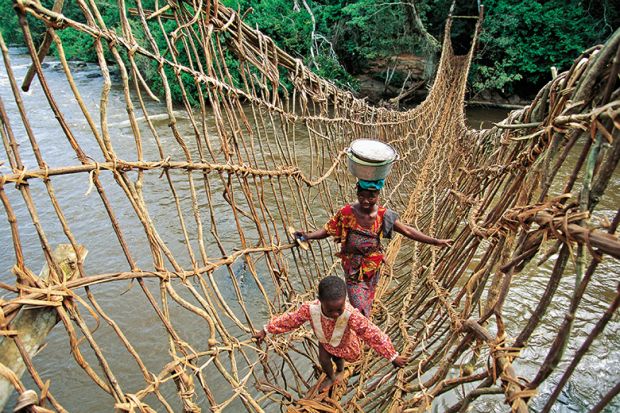BRICS & Emerging Economies University Rankings 2017: creating world-class universities in Africa
Institutions in developing economies are disadvantaged on key rankings criteria. We need to rethink the defining characteristics of the future world-class university, says Ihron Rensburg
November 30, 2016
Browse the full BRICS & Emerging Economies University Rankings 2017 results
In facing the challenge of nurturing world-class universities in our emerging economies, one of the most stubbornly common suppositions is that institutions in these countries are competing on an equal footing in global rankings with peers from developed economies. It seems to me that this idea requires a great deal of interrogation, and may even be fundamentally mistaken, and so it requires considered, continuing and thoughtful reflection.
It is appropriate that the starting point for such a reflection must be a consideration of the historical and contextual settings, limitations, institutional responsibilities and opportunities for the evolution of these universities. In order to develop my analysis, I will focus for illustrative purposes on Africa’s universities.
Africa’s universities had a most complex evolution immediately prior to and after the end of colonialism. Some 50 years ago, these institutions served, in the main, the economic and political elites of the periods, and accordingly they were small, serving far less than 1 per cent of national university-age populations.
These universities were nonetheless vital for training graduates who were expected to nurture the new post-colonial states and economies. However, these nation-states were founded on significant limitations: resources-based economies and fluctuating agriculture and commodity prices on the one hand, and low tax bases and low tax collection capabilities on the other.
Combined with the challenge of remedying enduring poverty and unemployment, these conditions were, soon after the end of colonialism, to render these nation-states paralysed and the subject of World Bank/International Monetary Fund structural adjustment programmes (SAPs) that prioritised basic needs. This set of circumstances was to eventually lead to the significant weakening and near-demise of Africa’s leading universities, notably Makerere, Ghana-Legon and Dar-es-Salaam.
It is worth noting that it was the unstinting criticism of the SAPs by Africa’s scholars, mainly through vehicles such as the Council for the Development of Social Science in Africa (CODESRIA), that was to lead to a positive shift away from the initial near-wholesale embrace of these devastating SAPs by African countries. With the revision of these programmes and concomitant policies, Africa’s universities, particularly in the past 10 years, have been on a rebuilding path, albeit one strewn with challenges: failing teaching and research infrastructure, large classes, and constrained time for undertaking vital fundamental and applied research.
Compounding matters is the enduring young demographic structure and the related and varied societal developmental needs, such as water and sanitation, public housing, public health, schooling, public transport, roads and food security. Even after the demise of World Bank/IMF structural adjustment programmes with their devastating effect on universities, and science and technology, the demand for investment in basic needs significantly constrain the capacities of Africa’s governments to invest in university education, and in science and technology, at a juncture when the opposite should be happening.
Claim a free copy of the BRICS & Emerging Economies Rankings digital supplement
With few exceptions, universities in emerging economies also face environments in which alumni, industry and private contributions to university education are weak to non-existent.
In these circumstances, states in emerging economies that seek to reposition their universities as world-class ones – as defined by rankings and by the leading universities in advanced economies – face the option of reallocating limited resources to universities and then risk protests and uprisings from those subsequently denied essential services, including public housing, health and schooling.
It is self-evident, then, that universities from emerging economies undertake their vitally important work under significantly different conditions from their peers in developed economies.
Having defined “world class”, university rankings reinforce this separation of universities between those from advanced and those from emerging economies. Rankings foreground precisely the advantages that disadvantage universities within emerging economies.
Consider the manner in which key rankings criteria are defined, calculated and weighted. For example, precisely at a time of very high student-to-lecturer ratios in universities within emerging economies, peers from developed economies with far lower student-to-lecturer ratios are distinctly advantaged, and I cannot see this changing in the near future.
Worse still, rankings give extraordinary weighting to reputation, whether determined by academic peers or employers, and these surveys are heavily weighted and dominated by Northern hemispheric peers and employers, who may have little insight into events and developments in universities within emerging economies.
How will it be possible for the African universities that have just begun their long-term institutional and reputational recovery to match up against peers when the reputation criteria knock them out even before we begin the talking? Ditto for measuring, calculating and weighting industry and alumni contributions to emerging-economy universities.
It is against this troubling and complex background that the University of Johannesburg hosts the 2016 THE BRICS & Emerging Economies Universities Summit, at which, under the theme “Reimagining the world-class university”, we will turn our attention to the question of the defining characteristics of the future (versus the past) world-class university, how we know one when we see it, and how we nurture these for future generations.
The summit will also provide an opportunity for the University of Johannesburg to share insights into what it has been undertaking that has seen it enter the top 4 per cent of universities worldwide on its first submission to the THE global ranking, and how it is nurturing a socio-economically, racially and gender-inclusive, responsive, and agile third-millennium university.


Sem comentários:
Enviar um comentário